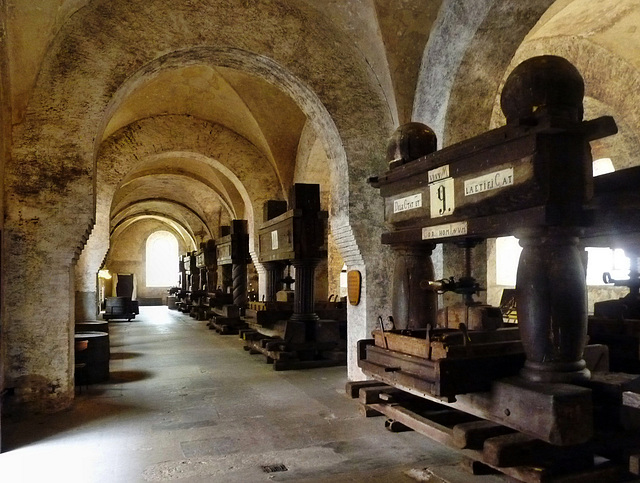Kloster Eberbach / Eberbach Abbey
Kloster Eberbach / Eberbach Abbey
Kloster Eberbach / Eberbach Abbey
Kloster Eberbach / Eberbach Abbey
Kloster Eberbach / Eberbach Abbey
Kloster Eberbach / Eberbach Abbey
Kloster Eberbach / Eberbach Abbey
Kloster Eberbach / Eberbach Abbey
Kloster Eberbach / Eberbach Abbey
Kloster Eberbach / Eberbach Abbey
Kloster Eberbach / Eberbach Abbey
Kloster Eberbach / Eberbach Abbey
Bonneval - Abbaye Saint-Florentin
Location
Keywords
Authorizations, license
-
Visible by: Everyone -
All rights reserved
-
145 visits
Kloster Eberbach / Eberbach Abbey


Kloster Eberbach was founded in 1136 by Bernard of Clairvaux as the first Cistercian monastery on the east bank of the Rhine. A small Benedictian monastery had been here before, but after the Cistercian "relaunch", the abbey really thrived, becoming one of the largest and economically most sucessful in Germany. During the 12th/13th century about 100 monks plus 200 lay brothers lived here. Already in 1211, Kloster Eberbach possessed more than 200 settlements, all quoted in the "Oculus Memoriae", an "inventory list".
Despite some setbacks due to wars, the monastery continued very sucessfully upto the time of the French Revolution, when the decline started. Politics changed dramatically during the time of secularisation. In 1803 the abbey was dissolved, the remaining monks were forced to leave. The complex with all assets came into the ownership of the last Prince of Nassau-Usingen. From 1866 on, it was owned by Prussia, later Hesse. The buildings were used as a prison and as a lunatic asylum during that time.
Meanwhile the management of the vast vineyards (~ 200 hectares) and wine production has continued in state hands. Great white wines are produced here! The buildings now are owned by a charitable foundation, aiming to maintain the important complex.
In the old lay-brothers´ refectory (erected ~ 1200) now is a line up of old wine presses. Some of these date back to medieval times.
With 300 hectares of vineyards (= 300.000m²) Kloster Eberbach was the largest producer in Europe in the old days. The abbey not oly had an own transport infrastructure, but as well entertained an office in Cologne to market the products.
The biggest cask here had a volume of more than 72.000 liters (equivalent to more than 100.000 "modern" bottles). In 1525, during the German peasant-war, the abbey was in the hands of the rebels for a few days. Time enough to empty this cask by two thirds.
kloster-eberbach.de/
If you want to see one of these wine presses at work, see this (German) video.
www.zdf.de/ZDFmediathek/beitrag/video/1454272/Eberbach---...
Despite some setbacks due to wars, the monastery continued very sucessfully upto the time of the French Revolution, when the decline started. Politics changed dramatically during the time of secularisation. In 1803 the abbey was dissolved, the remaining monks were forced to leave. The complex with all assets came into the ownership of the last Prince of Nassau-Usingen. From 1866 on, it was owned by Prussia, later Hesse. The buildings were used as a prison and as a lunatic asylum during that time.
Meanwhile the management of the vast vineyards (~ 200 hectares) and wine production has continued in state hands. Great white wines are produced here! The buildings now are owned by a charitable foundation, aiming to maintain the important complex.
In the old lay-brothers´ refectory (erected ~ 1200) now is a line up of old wine presses. Some of these date back to medieval times.
With 300 hectares of vineyards (= 300.000m²) Kloster Eberbach was the largest producer in Europe in the old days. The abbey not oly had an own transport infrastructure, but as well entertained an office in Cologne to market the products.
The biggest cask here had a volume of more than 72.000 liters (equivalent to more than 100.000 "modern" bottles). In 1525, during the German peasant-war, the abbey was in the hands of the rebels for a few days. Time enough to empty this cask by two thirds.
kloster-eberbach.de/
If you want to see one of these wine presses at work, see this (German) video.
www.zdf.de/ZDFmediathek/beitrag/video/1454272/Eberbach---...
- Keyboard shortcuts:
Jump to top
RSS feed- Latest comments - Subscribe to the comment feeds of this photo
- ipernity © 2007-2024
- Help & Contact
|
Club news
|
About ipernity
|
History |
ipernity Club & Prices |
Guide of good conduct
Donate | Group guidelines | Privacy policy | Terms of use | Statutes | In memoria -
Facebook
Twitter

Sign-in to write a comment.